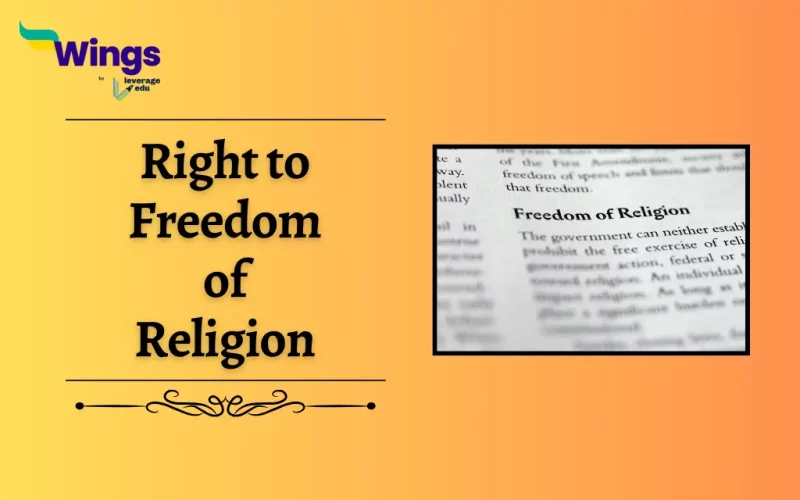According to the Indian Constitution, every citizen has the Right and freedom to practice, preach, and spread the religion of their choice. Furthermore, every believer can propagate their religion without the fear or intervention of the government. However, the Constitution also states that nobody has the right to spread religion by inflicting pain and inducing fear in society. Moreover, this liberty to practice and propagate religion without government intervention and societal fear is termed the Right to Freedom of Religion.
Table of Contents
Constitutional Provisions on the Right to Freedom of Religion
To grant this liberty to follow or not to follow a religion of choice, the Constituent Assembly included this right under Article 25 to Article 28. Under the worthy guidance of Dr. BR Ambedkar, the Assembly decided that the Right to Freedom of Religion should be a Fundamental Right in India as the nation is home to several religions. With consent, the following articles were embedded in the Constitution of India.
Also Read: Right to Freedom (Article 19-22)
Article 25: Freedom of Conscience and Free Profession, Practice and Propagation of Religion
According to this Fundamental Right, every person is equally entitled to the freedom of their beliefs and the ability to practice and share their religion.
- However, there are limitations to this right to maintain public order, morality, and peace.
- This provision will not interfere with existing laws or the government’s ability to create new laws.
- In addition, Article 15 will not hinder financial, economic, political, or non-religious activities related to religious practices.
- Nevertheless, government-operated institutions cannot promote any specific religion through education.
- Furthermore, the Right to convert does not include the right to forcibly convert others, as that would infringe upon their freedom of belief.
Also Read: What is Democracy? Structure, Types, Countries
Article 26: Freedom to Manage Religious Affairs
As per this Right to Freedom of Religion in the Indian Constitution, the freedom to administer religious matters encompasses the ability to establish and manage charitable institutions.
- This includes overseeing religious affairs or managing property, both movable and immovable, without violating the law.
- However, only organized entities like religious groups have the privilege to exercise this right.
- The government can oversee the non-religious activities of these associations.
- Although, this right does not extend to individuals.
- Religious bodies have the authority to establish and govern educational and charitable institutions independently unless there is a threat to public order.
Also Read: What is Communism?
Article 27: Freedom from Taxation for Promotion of a Religion
In line with this provision of the Right to Freedom of Religion under the Indian constitution, people cannot be forced to pay taxes that are specifically allocated for promoting or protecting a specific religion or religious group.
Also Read: What is Representative Democracy?
Article 28: Freedom from Attending Religious Instruction
As per this Fundamental Right, educational institutions funded entirely by the State are prohibited from providing religious instruction.
- Similarly, people enrolled in educational institutions recognised by the State or receiving State aid cannot be compelled to participate in religious teachings or worship conducted within those institutions or their premises.
- For minors, the consent of their guardian is necessary for such participation.
- In essence, Article 28 prevents religious instruction in State-funded and State-aided educational institutions.
Also Read: What Is Fascism: Definition, History, and Significance
Important Judgements on the Right to Freedom of Religion
Furthermore, here are the key judicial landmarks that upheld the Right to Freedom of Religion in India:
- Acharya Jagdishwaranand vs. Commissioner of Police, Calcutta
- Bijoe Emmanuel and Ors. vs. State of Kerala
- Ramji Lal Modi vs. State of UP
- M. Ismail Faruqui vs. Union of India
- Raja Birakishore vs. State of Orissa
- The Durgah Committee Ajmer vs. Syed Hussain Ali and Others
Related Blogs
Lastly, we hope you liked our blog and gained an understanding of the Right to Freedom of Religion. Moreover, you may even read more blogs and empower yourself with knowledge regarding Civics and Polity!
 One app for all your study abroad needs
One app for all your study abroad needs













